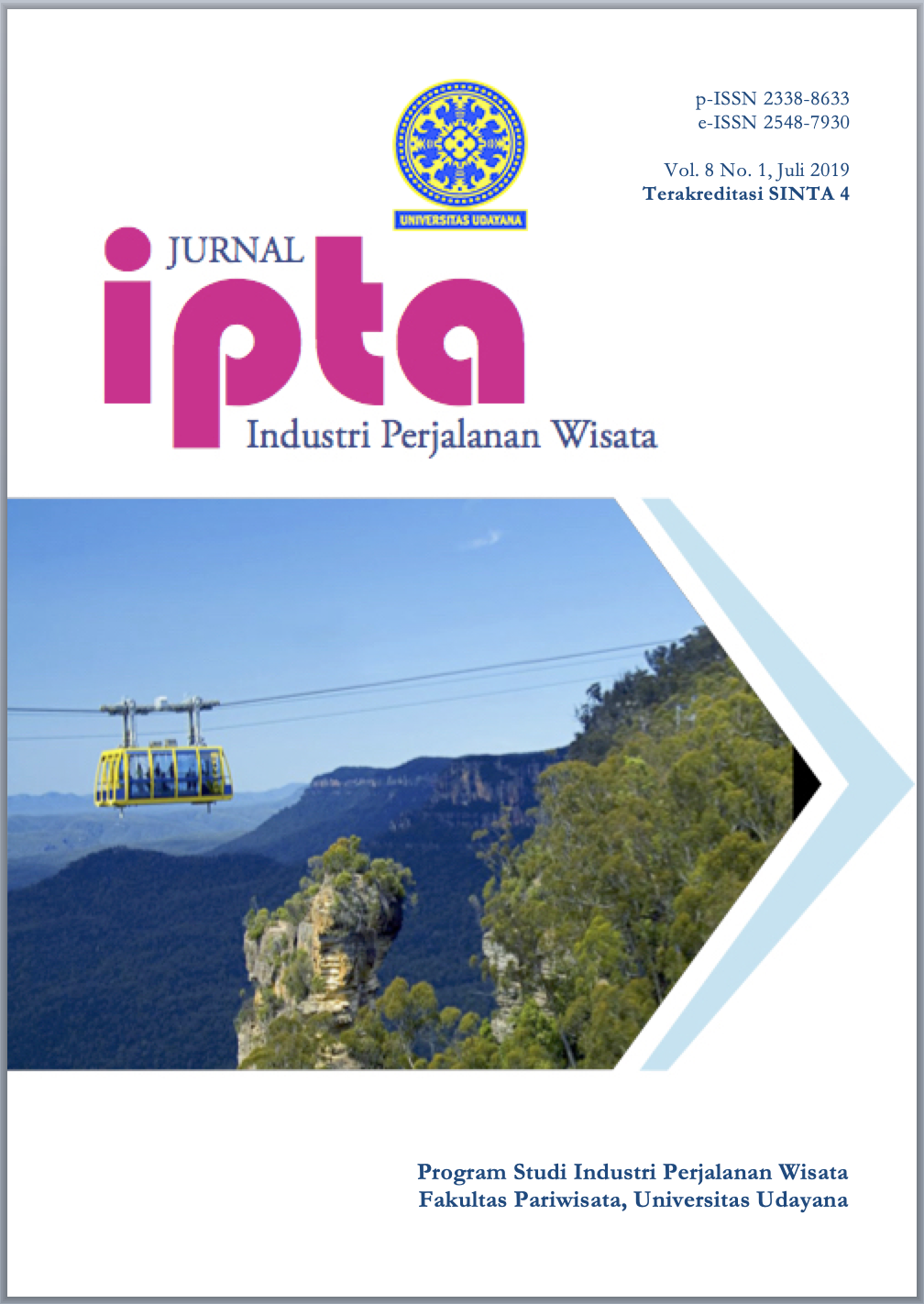ANALISIS FAKTOR PENDORONG DAN PENARIK WISATAWAN MILLENNIAL BERKUNJUNG KE KUTA SELATAN
Abstract
Millennial tourists are the most potential tourists at the moment because of their number in the world. Kuta Selatan is one of the well-known and attractive districts for millennials visiting Bali. Therefore the purpose of this study is to determine the push and pull factors of millennial tourists visiting South Kuta and what factors are dominantly encouraging and attracting tourists to visit South Kuta. This research uses descriptive quantitative data analysis which is processed using SPSS 18.0 for windows application. The sample was determined purposively by 200 millennial tourists visiting South Kuta. Data collection techniques were carried out by means of observation, questionnaires, interviews, literature studies, and documentation. Data analysis techniques are the validity test, reliability test, and factor analysis. The results showed that there were four push factors ecourage millennial tourists to visit South Kuta, namely: trying a new lifestyle, breaking away from boredom, friends or family and increasing self-esteem and five factors attracting millennial tourists visiting South Kuta, namely: factors the symptoms of Kuta Selatan, culture and tradition, price, variety of nightlife and clean, cool air. Based on the analysis it is known that the factor of trying a new lifestyle becomes the dominant factor that ecourage millennial tourists to visit South Kuta with an eigenvalue of 4.370 and a variance percentage of 29.133% while the viral factor of South Kuta becomes the dominant factor that attracts millennial tourists visiting South Kuta with a value eigenvalue of 6.788 and the total percentage of variance of 29.512%.
Downloads
References
Ghozali, Imam. 2005. Aplikasi Analisis Multivariate dengan SPSS. Semarang: Badan Penerbit UNDIP.
Goyette, et al, 2010, E-Wom : Word of Mouth Measurement Scale for E-Service Context, Journal of Administrative Sciences, Volume 27: 5-23.
Hair, et al. 2006. Multivariate Data Analysis 6th Ed. New Jersey : Pearson Education.
Lay, Olivia Dianti. 2013. Faktor Pendorong dan Faktor Penarik Wisatawan Surabaya Melakukan Perjalanan Wisata Ke Penang, Malaysia. Jurnal Tourism Retailing. Vol. 2, 2013.
Parhusip, Nina Ester. 2018. Wisatawan Milenial di Bali (Karakteristik, Motivasi, dan Makna Berwisata). Jurnal Destinasi Pariwisata, Vol. 6 no. 2, 2018.
Ryder, N. B. (1965). The Cohort as a Concept in the Study of Social Change. American Sociological Review, 30 (6), 843–861. https://doi.org/10.2307/2090964.
Schiffman, Leon, G.,Leslie Lazar Kanuk, 2000, Consumer Behavior, Edisi Tujuh, Prentice-Hall, New Jersey.
Sutrisno, Edy. 2013. Manajemen Sumber Daya Manusia, Cetakan Kelima. Yogyakarta: Prenada Media.
Yuan, S dan McDonald, C. 1990. Motivational Determinates Of International Pleasure Time. Jurnal Travel Research, 24(1), 42-44.

This work is licensed under a Creative Commons Attribution-ShareAlike 4.0 International License.





